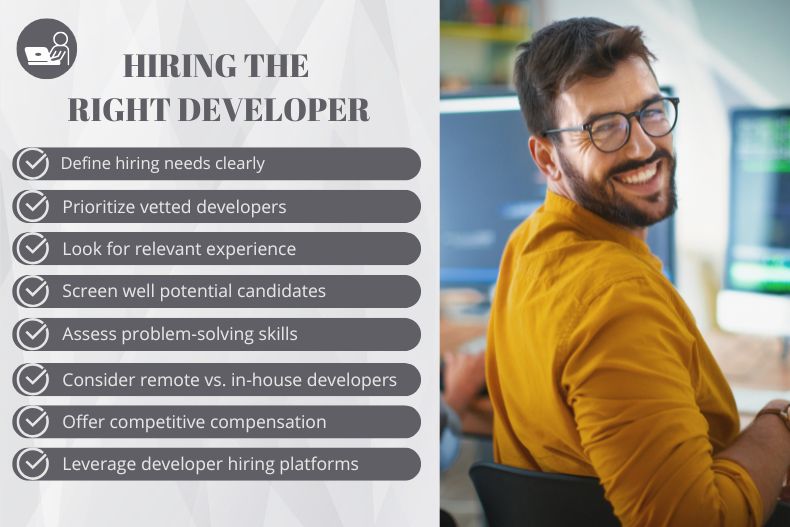Expanding your development team is critical for scaling your business, launching new products, or improving existing solutions. However, hiring the right developers can be challenging, especially with the increasing demand for skilled tech talent. A poor hiring decision can lead to delays, increased costs, and even security risks.
To hire the right developers, it’s essential to clearly define hiring needs, prioritize vetted developers, and leverage hiring platforms to find candidates who align with your project requirements, company culture, and long-term goals.
8 Key Tips to Hire the Right Developers

1. Define Your Hiring Needs Clearly
Before you start the hiring process, take the time to define exactly what you’re looking for. Consider:
- Technical Requirements: Do you need front-end, back-end, full-stack, or specialized developers (e.g., AI, blockchain, or mobile app developers)?
- Project Scope: Are you hiring for a one-time project, part-time role, or full-time position?
- Experience Level: Do you need junior developers to support basic tasks, or senior engineers to lead the project?
- Soft Skills: Beyond coding skills, developers should be able to communicate, collaborate, and problem-solve effectively.
Clearly outlining these factors will help you target the right candidates and avoid wasting time on unqualified applicants.
2. Prioritize Vetted Developers for Quality and Reliability
Hiring developers can be time-consuming, especially when filtering through countless resumes and portfolios. To save time and ensure quality, consider hiring from platforms that pre-screen and vet developers before they reach you.
Vetted developers go through technical assessments, coding tests, and background checks, ensuring they have the right skills and experience. This reduces hiring risks and helps you find candidates who are not only technically capable but also a cultural fit for your team.
If you’re looking for highly skilled professionals, it’s best to hire vetted developers through specialized platforms that match you with pre-qualified talent.
3. Look for Relevant Experience and Tech Stack Compatibility
A developer may have an impressive resume, but if they lack experience in your specific tech stack, they may struggle to adapt to your project. Make sure to check:
- Programming Languages: Ensure the developer is proficient in the languages and frameworks you use (e.g., JavaScript, Python, React, or Node.js).
- Industry Experience: If you’re building a fintech app, hiring a developer with fintech experience is a plus.
- Previous Projects: Review their portfolio or GitHub repositories to assess the complexity and quality of their past work.
For example, if you’re working on a React-based project, make sure to hire a React developer with hands-on experience in building scalable applications.
4. Use a Thorough Screening and Interview Process
To ensure you’re hiring the right developer, your screening process should be both technical and behavioral. Here’s an effective approach:
Step 1: Resume & Portfolio Review
Look for relevant experience, problem-solving skills, and consistency in past work.
Step 2: Technical Assessment
Conduct a coding test or live coding challenge to evaluate their problem-solving skills and coding style.
Step 3: Soft Skills Interview
Assess communication, teamwork, and adaptability. A great developer should be able to explain technical concepts clearly and collaborate effectively.
Step 4: Trial Project (Optional)
For high-stakes roles, consider a short trial project to see how the candidate performs in a real-world scenario.
A structured hiring process will help you identify not only strong technical candidates but also those who align with your company culture.
5. Assess Problem-Solving and Critical Thinking Skills
Technical skills are important, but a developer’s ability to think critically and solve problems efficiently is even more valuable. Ask open-ended questions during the interview to assess their approach to:
- Debugging and troubleshooting
- Optimizing code for performance
- Handling unexpected challenges in a project
This will give you insights into how they approach complex problems and whether they can adapt to real-world development scenarios.
6. Consider Remote vs. In-House Developers
Depending on your project, you may need to decide whether to hire remote or in-house developers. Each has its pros and cons:
- Remote Developers:
- Access to a global talent pool
- Cost savings, especially for startups
- Flexibility and scalability
- Requires strong communication tools and workflow management
- In-House Developers:
- Better team collaboration
- Easier to align with company culture
- Ideal for projects requiring real-time teamwork
If you’re open to remote hiring, you’ll have a much wider talent pool and can often find more cost-effective solutions.
7. Offer Competitive Compensation and Benefits
Top developers have plenty of options, so offering competitive salaries, benefits, and work flexibility will help you attract and retain the best talent. Consider:
- Market-competitive salaries
- Bonuses or performance-based incentives
- Flexible work arrangements (remote/hybrid options)
- Career growth opportunities (mentorship, training, certifications)
Beyond salary, offering additional financial incentives can make a significant impact. One option is deferred compensation, which allows employees to receive a portion of their earnings at a later date—often with tax advantages. If you’re considering this as part of your compensation package, check out our guide on deferred compensation, where we break down its types and benefits.
8. Leverage Developer Hiring Platforms
Instead of relying on traditional job boards, consider using specialized hiring platforms that connect businesses with pre-vetted, high-quality developers. These platforms eliminate the guesswork by providing access to developers who have already been tested and verified for their skills.
Some of the best platforms for hiring vetted developers include:
- Talent marketplaces specializing in tech hiring
- Freelance platforms with rigorous screening processes
- Remote job boards focused on developer talent
Using the right platform will streamline your hiring process and connect you with top-tier talent quickly. You can hire developers through recruitment agencies, referrals, developer communities, specialized job platforms such as:
- LinkedIn – Best for hiring full-time developers of all experience levels.
- GitHub – Ideal for finding open-source contributors and experienced coders.
- Stack Overflow – Connects with experts in specific programming languages.
- Toptal – Pre-vetted, top-tier freelance developers for premium projects.
- Upwork – A broad range of freelance developers for contract work.
- Wellfound– Great for startups seeking developers for full-time or equity roles.
- Tech Meetups – Connect with developers through industry events and networking.
Comparing Developer Hiring Options: Pros and Cons
Hiring Option Pros Cons
Full-time Employees ✔ Stable team, deep company knowledge, long-term commitment. ✘ Higher costs (salaries, benefits), longer hiring process, potential turnover.
Freelancers ✔ Flexible, cost-effective for short-term tasks, no long-term obligation. ✘ Less commitment, possible availability issues, communication challenges.
Agency ✔ Access to a skilled team, no need for in-house management, faster project execution. ✘ Higher costs than in-house hiring, potential quality control and communication barriers.
Contractual ✔ Lower commitment than full-time, allows trial period before permanent hire. ✘ Uncertainty for both parties, may not be available long-term, initial costs.
Interns & Fresh Graduates ✔ Cost-effective, fresh perspectives, potential to train and retain talent. ✘ Requires significant training and mentorship, risk of high turnover.
Remote Developers ✔ Access to a global talent pool, cost savings, increased flexibility. ✘ Time zone differences, communication barriers, requires strong remote management.
Things to Consider When Hiring the Right Developers
Finding the right developers depends on several key factors. Making the wrong choice can lead to wasted resources and delayed progress, so consider these points before hiring:
- Budget – What can you realistically afford without straining your finances?
- Project Scope & Timeline – Is this a short-term project or an ongoing need? What level of complexity is involved?
- Technical Expertise – Do you need specialized skills or a generalist who can adapt to different tasks?
- Team Integration – How essential is it for developers to work closely with your existing team and align with your company culture?
There’s no one-size-fits-all approach—each hiring model has advantages and drawbacks. Weighing these factors carefully will help you make a smart, cost-effective decision that aligns with your business goals.
Frequently Asked Questions (FAQs)
How do I determine whether I need a full-time developer or a freelancer?
If your project requires ongoing development, maintenance, and deep integration into your company culture, a full-time developer is ideal. If you need specialized skills for short-term tasks or temporary projects, hiring a freelancer can be a more cost-effective and flexible solution.
What skills should I prioritize when hiring developers?
Prioritize technical expertise relevant to your tech stack, problem-solving abilities, adaptability, and communication skills. Strong teamwork and alignment with your company’s work culture are also essential.
How can I ensure the quality of a developer before hiring?
Use a thorough screening process, including technical assessments, coding tests, real-world problem-solving tasks, and behavioral interviews. Checking portfolios, client reviews, and references also helps verify their skills and reliability.
Final Thoughts
Hiring the right developers is essential for expanding your team and driving business growth. By defining your needs, prioritizing vetted developers, and implementing a structured hiring process, you can find the best talent efficiently and with confidence.
Whether you need a React developer or a full-stack engineer, taking a strategic approach will help you build a strong and capable team. Make the right hiring decisions today to set your company up for long-term success!











